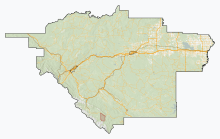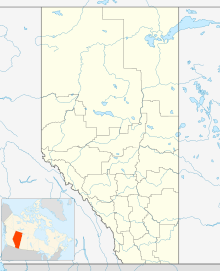Coalspur, Alberta facts for kids
Quick facts for kids
Coalspur
|
|
|---|---|
| Country | Canada |
| Province | Alberta |
| Municipal district | Yellowhead County |
| Government | |
| • Type | Unincorporated |
| Time zone | UTC−7 (MST) |
| • Summer (DST) | UTC−6 (MDT) |
| Area code(s) | 780, 587, 825 |
Coalspur is a small, almost abandoned town in Yellowhead County, Alberta, Canada. It was once a busy place for mining coal and for trains. You can find it on Alberta Highway 47, right next to the Embarras River, in the beautiful foothills of the Canadian Rockies.
Contents
The Story of Coalspur
|
|||||||||||||||
Coalspur began its life between 1911 and 1912. This was when the Grand Trunk Pacific Railway was building a special train line called the Alberta Coal Branch. This line was made to reach coal mines.
A Busy Railway Town
Coalspur was an important spot because it was where the train lines split. It became a central place for trains, with a large building called a roundhouse where trains were repaired. It was also home to the main office for the Brazeau Forest Reserve and the Alberta Provincial Police.
Coal Mining in Coalspur
Soon after the railway arrived in 1912, a group of investors from the UK started the Yellowhead Pass Coal and Coke Company. The Yellowhead Mine, located near Coalspur, was very important.
Life at the Mine
At first, about 70 men worked at the mine, producing 500 tons of coal every day. This helped the small community grow. When the mine was at its busiest, it employed 400 men! However, the mine faced big challenges, including large underground fires in 1915 and again in 1922. The Yellowhead Mine eventually closed in 1923, though other mines in the area kept working until the 1950s.
Searching for Oil and Gas
In 1924, Imperial Oil drilled a test well near Coalspur. This was one of the first times people looked for oil in this part of Alberta. They didn't find much oil, but they did discover a lot of natural gas. This gas was then used to heat the boilers at the mining camp. While no large amounts of oil were found in Coalspur itself, other natural gas fields were later discovered nearby.
Why Coalspur Shrank
During the 1950s, the population of Coalspur and the surrounding area began to shrink. This happened because trains started using diesel engines instead of steam locomotives. Diesel engines didn't need coal, so the demand for coal dropped, and many mines closed.
The Coalspur post office, which had been open since 1914, closed its doors in 1963. By 2001, only about a dozen people lived in Coalspur, showing how much the town had changed from its busy past.
 | Anna J. Cooper |
 | Mary McLeod Bethune |
 | Lillie Mae Bradford |



